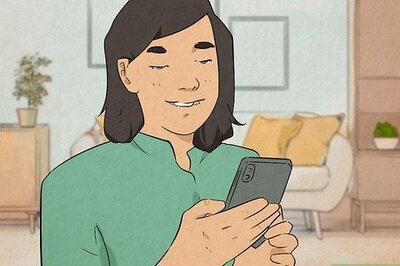
views
TOKYO: Bank of Japan Governor Haruhiko Kuroda said the central bank was ready to extend its programmes aimed at easing corporate funding strains that expire early next year, as the coronavirus pandemic keeps the economic outlook highly uncertain.
He also reiterated the BOJ’s resolve to work closely with the government in battling headwinds to Japan’s recovery such as the fallout from U.S.-China tensions and protectionism.
“There’s a good possibility we will extend the deadline for the programmes if needed, depending on the impact of COVID-19,” Kuroda told a news conference after his online meeting with business leaders in Osaka, western Japan, on Wednesday.
“We’ll make the decision at an appropriate timing and won’t wait until the last minute,” he added.
The BOJ ramped up purchases of corporate debt and created a lending facility to pump money to firms hit by COVID-19, as part of efforts to cushion the economic blow from the pandemic. Both programmes end in March next year, unless the BOJ’s board votes to extend the deadline.
“It’s true corporate funding remains tight. We’ll of course monitor developments carefully and take additional easing steps without hesitation if necessary,” Kuroda told the Osaka business leaders.
“We’d like to continue supporting corporate funding, working closely with the government,” he said.
Kuroda made the remarks after meeting Prime Minister Yoshihide Suga earlier in the day. It was their first meeting since Suga was elected as Japan’s new leader this month.
With the immediate hit from the pandemic easing, the BOJ kept monetary policy steady last week and upgraded its view on the economy to say it was starting to pick up.
Kuroda said the economy and prices were moving roughly in line with the BOJ’s latest forecasts made in July. But he warned that any economic recovery will be moderate with risks “skewed to the downside.”
“The shock exerted by the pandemic could push down corporate and household growth expectations, making them cautious about spending. That’s something we need to look out for,” he said.
Kuroda also said Japan’s consumer prices will likely keep falling for the time being due mostly to temporary discounts offered by the government to promote domestic tourism.
“Our baseline scenario is for consumer inflation to turn positive thereafter and accelerate its pace of increase as the economy improves,” he added, shrugging off the view Japan could slip back into chronic deflation.
Japan suffered its biggest economic slump on record in the second quarter as COVID-19 hit demand, reinforcing expectations inflation will remain well below the BOJ’s 2% target for years.
Disclaimer: This post has been auto-published from an agency feed without any modifications to the text and has not been reviewed by an editor


















Comments
0 comment